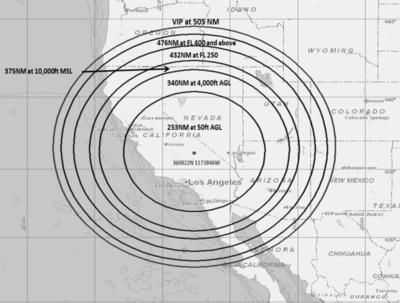Thu, Jun 09, 2016
Signals May Be Intermittently Unreliable Or Unavailable During The Month Of June
The FAA is conducting a series of GPS interference tests on the west coast of the U.S. during the month of June.

The testing began Tuesday centered at 360822N/1173846W or the BTY VOR 214 degree radial at 059 NM. The agency issued a NOTAM indicating that GPS signals may be unreliable or unavailable during the testing periods.
Additional tests are scheduled as follows:
- 9 JUN 16 1630Z – 2230Z
- 21 JUN 16 1630Z – 2230Z
- 23 JUN 16 1630Z – 2230Z
- 28 JUN 16 1630Z – 2230Z
- 30 JUN 16 1630Z – 2230Z
The altitude at which the reliability of GPS signals may be effected decreases depending on an aircraft's proximity to the testing site. According to the FAA, signals are affected as follows:
- 432NM RADIUS AT FL250
- 375NM RADIUS AT 10000FT
- 340NM RADIUS AT 4000FT AGL
- 253NM RADIUS AT 50FT AGL
The FAA singled out operators of Embraer Phenom 300 jets to pay particular attention to the NOTAM. According to the FAA, Embraer has recently received a report of GPS 1 and 2 simultaneous signal loss during fms navigation in cruise flight followed by a GPS HSI 1 and 2 failure indication, attitude and heading reference system (AHRS) 1 and 2 fault and, after a few minutes, a stall warning protection system (SWPS) fault, ventral rudder fail, yaw damper fail, auto pilot fail, and cas messages associated with unexpected rolling and yawing oscillations (dutch roll) at high airspeeds.
Further analysis revealed GPS constellation signal instability in the flight area leading to loss of both gps information data and causing the event described above. The AHRS continuously calculates and applies altitude and heading measurement updates to correct gyro-integrated altitude and heading during flight maneuvers and, in normal operation, the ahrs relies upon GPS, air data system and magnetic field measurements supplied by the magnetometer to maintain primary ahrs operation mode.
The dutch roll behavior may be expected for an airplane with no yaw damper and/or ventral rudder protection, especially on aircraft with swept wings. If this anomaly occurs controllers can expect the pilot may reduce speed below 240 kias and initiate an emergency descent.
All operational personnel must be briefed on this notice as soon as possible.
The FAA recommends that operators of Phenom jets avoid the test area during times that tests are being conducted.
(FAA image)
More News
Outboard Section Of The Right Wing And The Right Flap Separated In Flight And The Airplane Impacted A Farm Field Analysis: The pilot was approaching his destination airport under i>[...]
Final Approach Fix The fix from which the final approach (IFR) to an airport is executed and which identifies the beginning of the final approach segment. It is designated on Gover>[...]
"Our choice of when to respond, how to respond and on which targets to respond is a consideration that we make every time... Netanyahu also noted that anyone attacking Israel &ldqu>[...]
Estimated (EST) When used in NOTAMs “EST” is a contraction that is used by the issuing authority only when the condition is expected to return to service prior to the e>[...]
Aero Linx: Coalition of Airline Pilots Associations (CAPA) The Coalition of Airline Pilots Associations (CAPA) is the world’s largest pilot trade association representing ove>[...]
 NTSB Final Report: Cessna 177B
NTSB Final Report: Cessna 177B ANN's Daily Aero-Term (05.08.25): Final Approach Fix
ANN's Daily Aero-Term (05.08.25): Final Approach Fix Aero-News: Quote of the Day (05.08.25)
Aero-News: Quote of the Day (05.08.25) ANN's Daily Aero-Term (05.09.25): Estimated (EST)
ANN's Daily Aero-Term (05.09.25): Estimated (EST) ANN's Daily Aero-Linx (05.09.25)
ANN's Daily Aero-Linx (05.09.25)



